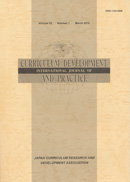Volume 14, Issue 1
Displaying 1-5 of 5 articles from this issue
- |<
- <
- 1
- >
- >|
-
Article type: Article
2012 Volume 14 Issue 1 Pages 1-13
Published: 2012
Released on J-STAGE: January 07, 2018
Download PDF (1066K) -
Article type: Article
2012 Volume 14 Issue 1 Pages 15-27
Published: 2012
Released on J-STAGE: January 07, 2018
Download PDF (963K) -
Article type: Article
2012 Volume 14 Issue 1 Pages 29-38
Published: 2012
Released on J-STAGE: January 07, 2018
Download PDF (2980K) -
Article type: Article
2012 Volume 14 Issue 1 Pages 39-50
Published: 2012
Released on J-STAGE: January 07, 2018
Download PDF (1053K) -
Article type: Article
2012 Volume 14 Issue 1 Pages 51-62
Published: 2012
Released on J-STAGE: January 07, 2018
Download PDF (1018K)
- |<
- <
- 1
- >
- >|
